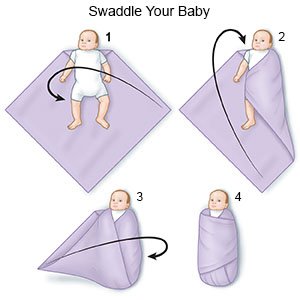Neonatal Abstinence Syndrome
Medically reviewed by Drugs.com. Last updated on Aug 4, 2025.
Neonatal abstinence syndrome (NAS) develops when a baby is no longer exposed to a substance his or her mother used during pregnancy. The baby is affected by the substance while in the womb and becomes dependent on it. When the baby is born, he or she is still dependent on the substance. The baby may also become dependent on medicines given for sedation or pain after he or she is born. The sudden lack of the substance causes withdrawal symptoms.
DISCHARGE INSTRUCTIONS:
Call your local emergency number (911 in the US) for any of the following:
- Your baby is not breathing or is having trouble breathing.
- Your baby's skin or nails are blue.
- Your baby is limp and does not respond.
Return to the emergency department if:
- Your baby stops breathing for short periods of time.
Call your baby's doctor if:
- Your baby is fussy or cries for long periods and cannot be comforted.
- Your baby breastfeeds less often or drinks less formula than usual or has feeding problems.
- You have questions or concerns about your baby's condition or care.
Medicines:
- Medicines may be given to help your baby go through withdrawal. He or she may only be given enough medicine to last until his or her first follow-up visit. It is very important to give all medicines exactly as directed.
- Give your child's medicine as directed. Contact your child's healthcare provider if you think the medicine is not working as expected. Tell the provider if your child is allergic to any medicine. Keep a current list of the medicines, vitamins, and herbs your child takes. Include the amounts, and when, how, and why they are taken. Bring the list or the medicines in their containers to follow-up visits. Carry your child's medicine list with you in case of an emergency.
Nutrition:
Extra calories may be needed. Your baby may be given formula that is thickened or has a high number of calories. Your baby may be able to breastfeed if his or her mother is not taking any substances that can be passed through breast milk. Your baby may need to be fed small amounts often during the day to prevent vomiting.
Ask about safe ways to comfort your baby:
Some babies are calmed by movement. Others need to be kept still and quiet. Find out what calms your baby. Your baby may cry for long periods without stopping. This can be frustrating, but never shake a baby to make him or her stop crying. Shaking can cause serious brain damage. The following may help you safely comfort your baby:
- Ask healthcare providers what they did to calm your baby. Talk with them before you take your baby home from the hospital.
- Put your baby in a safe place if you need a break. Ask a family member or friend to hold your baby. If no one can help, gently place your baby in his or her crib and leave the room for 5 or 10 minutes. Then go back to your baby and try to comfort him or her again.
- Use a light blanket to swaddle (wrap) your baby snugly. Your baby's healthcare provider can show you how to swaddle your baby if you do not know how. Do not wrap your baby too tightly.

- Decrease noise or light that may bother or wake your baby. When your baby is trying to go to sleep, play soft music, or sing softly. A fan or humidifier can create a low steady noise that he or she may also find comforting. Dim the lights in the room if your baby is bothered by the light.
- Try movement to calm your baby. Try putting your baby in an automatic swing or sitting with him or her in a rocking chair. Never shake your baby. You may cause brain damage if you shake him or her.
Treatment options
The following list of medications are related to or used in the treatment of this condition.
Follow up with your baby's doctor within 48 hours, or as directed:
You will need to bring your baby in for follow-up visits often at first. Your baby's healthcare provider will check that your baby is eating and sleeping well. Your child will need ongoing care and tests as he or she gets older. The provider will check for developmental or physical delays or problems. Write down your questions so you remember to ask them during your visits.
© Copyright Merative 2025 Information is for End User's use only and may not be sold, redistributed or otherwise used for commercial purposes.
The above information is an educational aid only. It is not intended as medical advice for individual conditions or treatments. Talk to your doctor, nurse or pharmacist before following any medical regimen to see if it is safe and effective for you.
Learn more about Neonatal Abstinence Syndrome
- Bath Salts Drug
- Can a Drug Test Lead to a False Positive?
- Cannabis: Uses, Effects and Safety
- Cocaine
- Devil's Breath: Urban Legend or the World's Most Scary Drug?
- Drug and Substance Abuse
- Ecstasy
- GHB or Gamma-Hydroxybutyrate
- Hashish
- Heroin
- Ketamine Abuse
Treatment options
Care guides
Further information
Always consult your healthcare provider to ensure the information displayed on this page applies to your personal circumstances.
